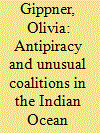|
|
|
Sort Order |
|
|
|
Items / Page
|
|
|
|
|
|
|
| Srl | Item |
| 1 |
ID:
151696


|
|
|
|
|
| Summary/Abstract |
Piracy and threats from non-state actors in the Gulf of Aden have triggered states to cooperate in securing waterways and the sea lines of communication, a development that is fundamentally transforming the region’s maritime security environment. As a result, not only has this region’s strategic importance been reaffirmed, but it has also gained tremendous importance through the presence of several actors, especially China and India. Since 2008, these two countries have been involved in larger global actions against piracy, which has led to increasing contact between their navies and more exposure of their capabilities. Will the broader Indian Ocean region emerge as an area of cooperation or competition between China and India? Drawing on interviews carried out with Chinese and European experts from 2012 to 2015, this article explores the reasons for and instruments of cooperation in antipiracy and the degree to which China uses antipiracy efforts as confidence-building measures.
|
|
|
|
|
|
|
|
|
|
|
|
|
|
|
|
| 2 |
ID:
126163


|
|
|
|
|
| Publication |
2013.
|
| Summary/Abstract |
Underinvestment, low levels of electricity access, natural disasters, topography and hydrology make Nepal's electricity crisis akin to 'peeling a pickle': difficult to pin down and hard to manage. Based primarily on the perceptions of a sample of experts, this article lays out a roadmap for how the 'pickle' of the Nepali electricity crisis can be peeled. Drawing on primary data collection from research interviews, the study offers a brief summary of the Nepali electricity and energy sectors. It then details six separate electricity challenges identified by respondents-topography and climate; political instability resulting from the aftermath of the Maoist insurgency; poverty and corruption; lack of financing and investment; constrained technological and human resources; and, finally, aid dependency and political manoeuvring. We conclude by calling on Nepali policymakers to invest in distributed generation, transmission upgrades, seasonal hydroelectric storage and industrial energy efficiency practices, and to introduce electricity tariff reforms, among other measures.
|
|
|
|
|
|
|
|
|
|
|
|
|
|
|
|
|
|
|
|
|